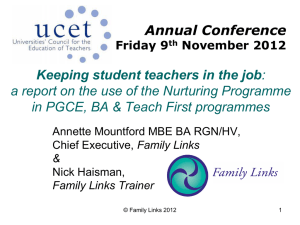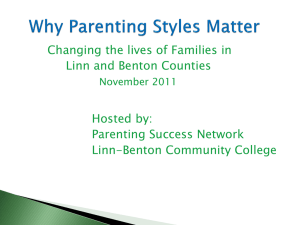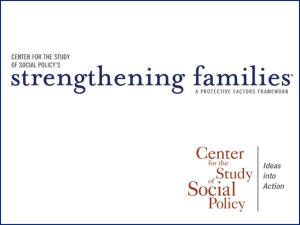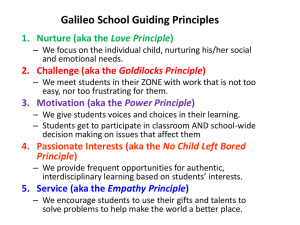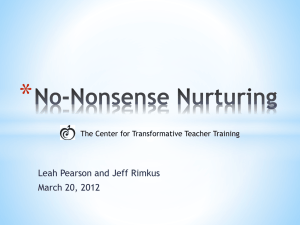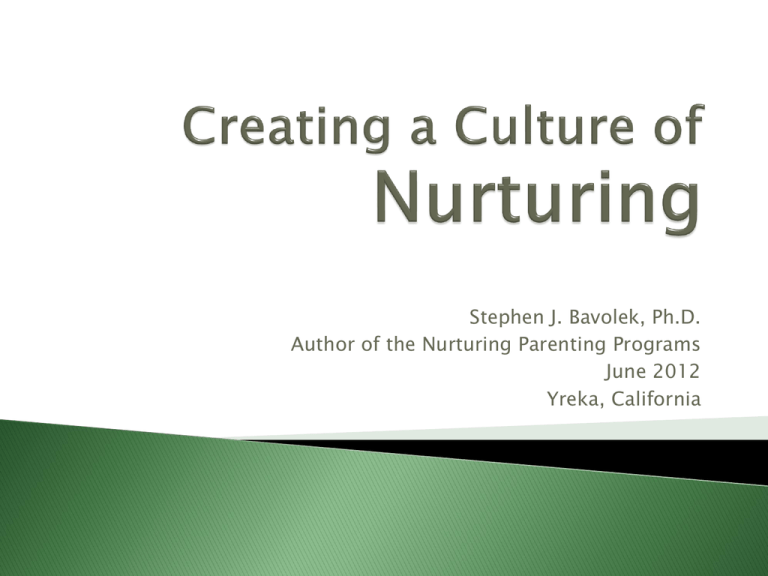
Stephen J. Bavolek, Ph.D.
Author of the Nurturing Parenting Programs
June 2012
Yreka, California
Compassion,
Communication,
Cooperation,
Confidence
in Parents and Children
Philosophy is a well thought out set of
beliefs.
A defined philosophy allows individuals to
make conscious, congruent choices.
Parenting entails a set of unconscious beliefs
and practices that have been past down and
recycled to another generation of children
without understanding or challenge.
The best parents/teachers make conscious,
informed choices in raising/teaching their
children.
Nurturing embraces the
philosophy of
raising/teaching children in non-violent, caring
environments
Building family attachments, empathy, and
compassion
Understanding brain development and functioning
Enhancing self-concept, self esteem and self worth
Empowering children, teens and adults
Teaching and utilizing discipline with dignity
Increasing self-awareness and self-acceptance
Promoting fun, laughter, and play
Research on the effectiveness of different
strategies and techniques in parenting and
teaching children.
The effects of nurture on the nature of brain
development and its functioning.
The impact of childhood experiences.
The differences between opinions, beliefs,
personal experiences, personal truths, and
scientific facts when teaching information.
science
Nurturing embraces the
of promoting
proven beliefs, strategies and techniques in
developing a positive and healthy quality of life:
* The impact of long term nurturing practices on
brain development and functioning.
* The science of positive touch, positive
communication, dignified discipline, expectations
and empowerment on the overall mental and
physical of children’s development
Understands the motivations and
reinforcers of behavior.
Aware of the impact the quality of childhood
has on the life styles and parenting/teaching
styles of adults.
Understands how the brain normalizes
repeated experiences and develops
neurological pathways which directs behavior.
Understands and accepts one’s own personal
history and influence as a parent and teacher.
Nurturing embraces the clinical
understanding of human behavior including:
• Basic needs of human beings and role identity
• Differences between “being” (our humanness)
and “doing” (our behavior).
• The key aspects of bonding, attachment
attunement, and empathy.
• How brain chemistry influences our behavior.
• Differences between male and female brains.
Skillful in facilitating groups/classrooms.
Skillful in conducting home-visits.
Skillful in working with children and teens in
groups and one-to-one.
Creates a comfortable, positive learning
environment.
Is capable of using assessment data to
develop meaningful instruction.
Knows the difference between primary,
secondary and tertiary prevention levels.
The word nurturing comes from the Latin
word
nu tri tura:
to Promote,
Nurse,
Nourish Life
Nurturing is the single most critical process for
creating and sustaining life.
The energy of nurturing is nondiscriminatory.
Both positive and negative nurturing
exists.
Positive nurturing is nourishing the aspects
of life we want.
Negative nurturing is nourishing the
aspects of life we don’t want, but get
anyway.
Positive nurturing is called EMPATHY which
Comes from the Greek word
empatheia
Empathy is one of the most important
characteristics of a nurturing parent.
The ability to imagine yourself in someone
else’s position and to intuit what that person
is feeling.
to project into or identify with another.
to enter fully through understanding
another’s feelings or motives.
To stand in someone’s shoes, to see what
they see, to hear what they hear, and to feel
with your heart.
Negative nurturing is called
abuse and neglect.
The word abuse comes from the Latin word
abusus
which means to mistreat; cruel and harsh
punishment.
Neglect comes from the Latin word
neglegere
neg means “not” and
legere means “pick
up.”
Neglectful parenting means not holding or
touching children.
Positive Nurturing (Empathy)
Frequency
Intensity
Always
Very High
10
Frequent
High
9 8 7
Sometimes
Average
6 5 4
Infrequent
Low
3 2 1
Never
Not Present
0
Negative Nurturing (Abuse and Neglect)
Frequency
Intensity
Never
Not Present
0
Infrequent
Low
1 2 3
Sometimes
Average
4 5 6
Frequent
High
7 8 9
Always
Very High
10
The following chart displays how personalities
and behavior patterns are influenced early in
life based on the quality of life in childhood
portrayed in hours.
There are approximately
157,776 hours
in the first 18 years of life.
Positive % Negative %
20%
80%
30%
70%
50%
50%
70%
30%
80%
20%
90%
10%
95%
5%
99%
1%
100%
0%
Pos Hours Neg Hours
31,555
126,220
47,333
110,443
78,888
78,888
110,443
47,333
126,221
31,555
141,998
15,778
149,887
7,889
156,198
1,578
157,776
0
The positive and negative
impact of life’s past
events shape our cognitive,
emotional and neurological
responses to current events.
Positive nurturing parenting is nourishing the
aspects of life we want.
A. Developing positive self worth by having
appropriate expectations.
B.
Developing a sense of caring and compassion by
building empathy in parents and children.
C. Providing children with dignified discipline.
D. Increasing awareness in parents and children of
appropriate family functioning.
E.
Developing a healthy sense of empowerment in
parents and children.
Negative nurturing parenting is nourishing the
aspects of life we don’t want, but get anyway.
Low or negative self-worth through inappropriate
expectations of children.
Lacking an empathic response to self and
children’s needs.
Using physical and verbal punishments on children.
Reversing family roles where children “parent” the
adult.
Oppressing children’s power and independence
Nature: Physical traits and genetic predispositions
received upon conception.
Nature also entails the predisposed characteristics
of the species called “homo sapien” (the wise man).
Nurture: The positive or negative influences the
environment has on our nature (genetic
predispositions).
Human personality is 80% Nurture; 20% Nature.
A heritable trait is one that’s caused by your
genes rather than your upbringing.
Dominant and Recessive Genes
Physical traits and behaviors passed on through
DNA:
Eye color
Tongue roller
Patterned baldness
Height
Intelligence Blood type
Predisposition: a tendency; inclination;
ADHD- Attention Deficit Hyperactivity
Disorder
Alcohol addiction
Depression and other mental health
conditions
Temperament
Predisposition to certain cancers and
illnesses
Researchers now agree that certain negative
characteristics of nature can be “nurtured” out in
future generations.
Epigenetics is showing how your environment and
your choices can influence your genetic code as
well as your children’s genetic code.
Example: Diet, stress and prenatal nutrition can
make an imprint on genes that is passed to the
next generation.
1.
2.
3.
4.
Predisposed to form and sustain long term
positive nurturing relationships.
Predisposed to seek moral and spiritual
meaning.
Positive nurturing relationships and a
connection to your spiritual power improve
long term health.
Positive nurturing environment shapes
children’s emotions, thoughts, behavior and
brain development.
The following are basic beliefs and
practices that adults need to adopt
into their personal life to be
prepared to implement the
nurturing philosophy into their
parenting and teaching practices.
“Being” constitutes the core elements of our
identity; our personality.
“Doing” constitutes our behavior
Behavior does not define a person, rather
describes a person’s actions and state of
consciousness at that moment.
A role is generally defined as a set of behaviors
that are time and situation specific.
There are three primary categories of roles (doings)
that humans (beings) generally are involved:
◦ Family Roles —mother/father, husband/wife brother/sister,
aunt/uncle, niece/ nephew, grandmother/grandfather, etc.
◦ Work/Career Roles —teacher, lawyer, auto worker,
politician, laborer, social worker, parent educator, student,
etc.
◦ Community Roles —neighbor, cub-scout leader, den
mother, consumer, volunteer coach, PTA, etc.
Nurturing Mommies and Daddies are created
from nurturing women and men
Caregivers that nurture themselves
as men or women are better
equipped to nurture others.
Burnout and stress are the result of ignoring
the basic needs of self.
Social-need for friendships, others
Physical-food, water, exercise, sex
Intellectual- read, problem solve, facts
Creativity- art, dance, dress, tattoos
Emotional-need to express feelings
Spiritual-need for belonging, purpose
“You make me angry!”
“It’s your fault. You made me……..”
“That kid makes me furious”
“You are my everything”
“You made me love you…..”
“You drive me crazy….. To my wits end”
The Pinocchio Effect
Good spankings
Good tongue lashing
Good beatings
Good slap
Constructive criticism
Treat your children the way you would be
liked to be treated
Based on adults understanding and adopting
nurturing beliefs and practices, the following
are strategies to enhance the four C’s of
Nurturing:
Compassion
Communication
Cooperation
Confidence
1. Recognizing, understanding and handling
feelings.
2. Managing stress, sadness and anger.
3. Teaching children how to recognize feelings
in others.
4. Taking care of objects (toys and clothes); of
other life forms (plants and animals); and other
humans (having friends, baby sitting,
brothers/sisters)
1. Honoring a child’s desire
2. Replacing blaming statements with
responsibility statements
3. Pay attention to what you want and not to
what you don’t want.
4. Too many “no” statements without
corresponding “yes” statements.
1. Elimination of corporal punishment and
replacement with consequences with dignity.
2. Develop Family Morals, Values and Rules
3. Praise for Being and Doing statements
4. Special recognitions: red plate
1. Building self-concept, esteem and value through
helping children get their needs met.
2. Owning feelings and teaching children how to
express their feelings respecting self, others
(including animals) and objects.
3. Owning one’s body parts
4. Bed time power stories
Family Development Resources, Inc.
Publishers of the Nurturing Parenting Programs®
Visit our Website at www.nurturingparenting.com
“An elder Cherokee Native American was
teaching his grandchild about life. He said to his
grandchild …
“A fight is going on inside of me … and it is a terrible fight and
it is between two wolves.
One wolf represents fear, anger, envy, sorrow, regret, greed,
arrogance, self-pity, guilt, resentment, inferiority, lies, false
pride, superiority and ego.
The other wolf stands for honor, joy, peace, love, hope,
sharing, serenity, humility, kindness, benevolence, friendship,
empathy, generosity, truth, compassion, and faith.
The same fight is going on inside of you and inside of every
other human being too.”
After thinking about it for a minute or two, the grandchild
asked her grandfather, “Which wolf will win”?
The old man leaned toward his grandchild and whispered …
“The one you feed.”
1.
2.
3.
4.
5.
Make time to take care for your self.
Know the difference between “being” and
“doing”
Know the difference between your “self” and
your “roles”
Stay in control of your thoughts and
feelings: the Pinocchio Effect
Respect your kids and they will respect you.
Self Concept: What do I think about my self?
Self Esteem: How do I feel about my self?
Self Worth: Do I value my self?
“I should take care of my self!”


